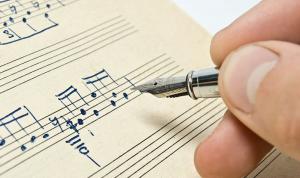How the heck do you write a piece of classical music? Part 3.

I said I would write something this time about what I called the 'common sense' bit of composing. What I think this comes down to is actually 'why are you composing?' Let me explain. Think of the different possible reasons for composing:
- Because you can't help it - you just have stuff in your head you need to get out.
- Because you've been asked to compose something for a clarinet conference
- Because you can't find a modern piece with the instrumentation that you want, so you're going to write it yourself
- Because you have ideas that nobody else seems to have used before
And of course there are others. In my opinion the best reason for composing is to have that music played/sung. Why compose for the ether? File away all manner of compositions that are never going to see the light of day? (yes, sure, it's ok to just write music as an exercise - one needs to practice composition). I think composition should be needs lead: i.e. write music because there's a need for it.
If you're the new Stockhausen and you're going to progress the art of composition by what you write then good luck to you, but I suspect your music isn't going to get much airplay (well, to be honest neither is mine, but that's for a different reason!). You've spent ages delving into new clarinet techniques to write into the piece you're writing for that clarinet conference. And yes, a group at the conference plays it, but it receives zero further performances. I'm waffling ... part of what I'm saying is "use your common sense: write music that is needed, is asked for in some way, and write music that people will want to play" (well, and listen to, but that's the topic of next week's blog!).
I wrote something when I was at school that had an important organ part in it. My teacher (who was an organist) pointed out that a lot of buildings where concerts are given don't have an organ (or don't have a good one). Better to choose 'common' instruments.
So, to write a piece of classical music: use standard instruments, use standard techniques (there are already masses, so don't bother trying to re-invent the wheel), and write for a sensible size of group. Of course, if you are writing because your music has been asked for in some way, then a lot of that will be determined for you. Or should be. Take note by the way if you do write for a specific situation that you know what instruments are available, and how good the players are ... don't write something for an amateur or youth orchestra that includes lots of bottom Bbs for the 2nd oboe :)
I'm doing you (myself) a favour here! If you think "I'll write a piece of music" you've given yourself a seriously broad remit, which is very hard to fulfill. If your remit is narrowed down by the realities of writing for a particular place/group/concert/building etc then it becomes much easier to fulfill (and to know that you've fulfilled it). The difficult bit (and I would call this the inspiration) is how to take all of the constraints that you have and write something that is interesting to play ... not too hard, perhaps also not too easy, music that 'says' something ... and of course, music that people will want to listen to ... which takes me to next week ... :)



